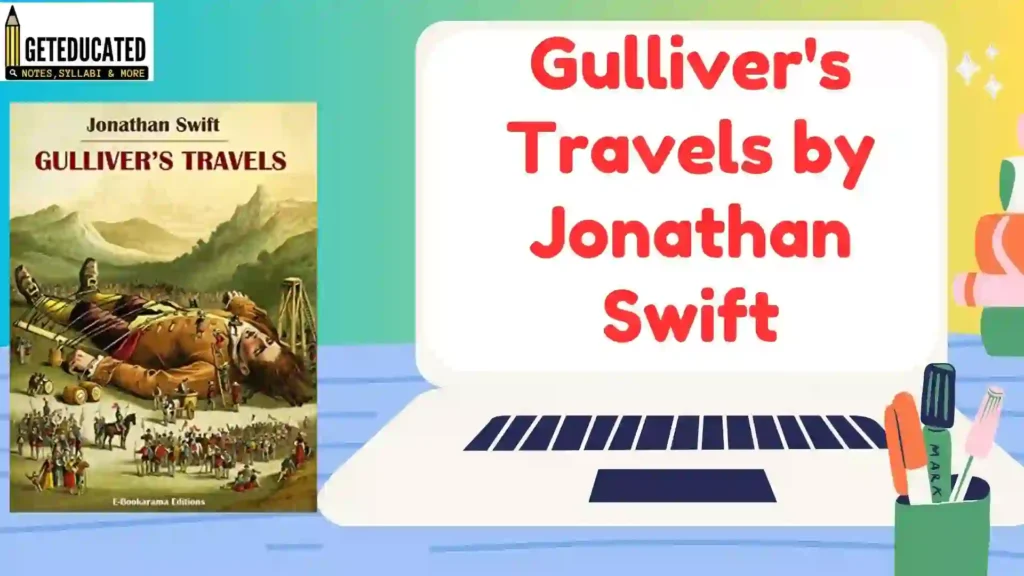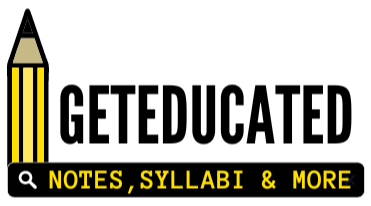
Detailed Character Analysis of Houyhnhnms :- For a long time the fourth voyage of Gulliver’s Travels was regarded as the outburst of a misanthrope who took pleasure in degrading human nature. Swift was hostile to all doctrines of the natural self-sufficiency of man; and the fourth voyage embodies that hostility. But while the object of attack in this voyage is established, it is not immediately clear, from the voyage itself, where any positive attitude is implied in the Houyhnhnms or in the other characters.
There is much in the Houyhnhnms that we find to be unpleasant and unacceptable. The arguments offered by the speakers at the Assembly of the Houyhnhnms, about the nature and future fate of Gulliver and the Yahoos, for instance, show the characteristic coldness of the Houyhnhnm’s race. Again, the Houyhnhnm to whom Gulliver refers as his “master”, shows the characteristic self-satisfaction of his race when he criticizes Gulliver’s physical qualities. This self-satisfaction is, indeed, carried here to the point of absurdity. Gulliver’s master criticizes the flatness of Gulliver’s face, the prominence of his nose, his eyes placed directly in front so that he cannot look on either side without turning his head, the need for Gulliver to lift one of his fore-feet to his mouth in order to feed himself, and so on. This attitude of the Houyhnhnm master certainly goes against his race.
In general, the horse is calm (he quietly removes the too-familiar hand when Gulliver attempts to stroke him), intellectually curious (he examines and reexamines Gulliver), deliberate (he makes no hasty judgment on this interesting Yahoo he has found), and relatively passionless (the only passion he displays is indignation, which is “anger excited by that which is unworthy, base or disgraceful”). His reason gives him nature as a standard (he cannot understand lying, an unnatural use of speech, nor how nature could instruct creatures to conceal what nature gave). With his devotion to nature, too, comes some difficulty of understanding what is foreign to his experience (he asks what can be the necessity or use of man’s vices). The noble Houyhnhnm, however, lacks the passions that might make him a model for man’s imitation, since man’s struggle for goodness involves as a basic necessity the discipline and control of his passions and the use of those passions to move him to good. The horse cultivates benevolence, which in him lacks the force of human love; the horse’s child or wife is no more to him than the Houyhnhnm in the farthest corner of the realm. In the Houyhnhnm there is no true warmth.
ALSO READ :
Gulliver’s Voyage to Laputa
Likewise, in the fourth voyage the Houyhnhnms are not presented fairly and squarely for our unqualified approval. The radical primitivism and rationalism of the Houyhnhnms has not been offered to us as completely and thoroughly desirable. The portrayal of the Houyhnhnms is accompanied by an ironic and sceptical withdrawal on the part of the author. Swift, then, uses the Houyhnhnms not as a complete statement of the right kind of man or society, but as a satiric contrast in which good and less good are mixed. Several of the characteristics of the Houyhnhnms are intended to show their remoteness from, and their irrelevance to, the ordinary life and standards of mankind. Primitivism, for instance, is used precisely for this effect. The Houyhnhnms have great difficulty in understanding such humanly simple matters as Gulliver’s clothes, his ship, and his writing. The Houyhnhnm master, in his dealings with Gulliver in Chapter 3, is not only unattractive, but unattractive in a particular way. The Houyhnhnm master’s condemnation of Gulliver’s physical characteristics also, as already pointed out above, shows the Houyhnhnms’ inability to understand the human point of view. This condemnation shows, further, the Houyhnhnm master’s self-righteousness and his determination to belittle the human race which in its own land claims to rule over the race of the horses.
The horse should not be taken as an ideal for human imitation. His condition, too much above passion, cuts him off from the human situation. Swift’s friend, Alexander Pope, seven years after the Travels appeared, spoke thus of passion in the life of man :
But strength of mind is Exercise, not Rest;
The rising tempest puts in act the soul.
Parts it may ravage, but preserves the whole.
On life’s vast ocean diversely we sail,
Reason the card [compass], but Passion is the gale;
Nor God alone in the still calm we find,
He mounts the storm, and walks upon the wind.
In some ways the life of the Houyhnhnms seems suggested by the lines that preceded those just quoted. Pope had said:
In lazy Apathy let Stoics boast
Their Virtue fixed; tis fixed as in a frost;
for apathy is a lack of feeling, a lack of passion or emotion.
The Houyhnhnms, we find, are alien and unsympathetic beings; they are not mankind at its best. In fact, they represent a kind of life with which mankind has little to do. The Houyhnhnms are not human beings but virtuous animals, perfect but limited natural creatures. They are of a nature which is irrelevant to man. They are-incapable of the heights as well as the depths to which mankind can reach. The Houyhnhnms have no shame, no temptations, no conception of sin. They are totally unable to understand the purpose of lying or other common temptations of mankind. They can live by reason because they have been created passionless. In man, as we know, the passions are apt to have the better of the reason and the result of this in its extrement form is seen in the Yahoos. But the Houyhnhnms have no passions to control. Gulliver thus describes the Houyhnhnms: “As these noble Houyhnhnms are endowed by nature with a general disposition to all virtues, and have no conceptions or ideas of what is evil in a rational creature, so their grand ,maxim is to cultivate reason and to be wholly governed by it.”
In the Houyhnhnms nature and reason are identical. They have no natural affections in the human sense. Nature has taught them to be equally benevolent to everyone, and to make a distinction of persons only on the rational grounds of a superior degree of virtue. They undertake marriage simply as “one of the necessary actions in a reasonable being”. Each one reproduce two colts of each and by that means they control the population. They have no fear of death either. They treat death with the same complete absence of emotion that they show towards every other event. These attitudes are not those which nature teaches human beings. Man has affections and passions, and Swift does not seem to regard them as wholly bad. The painful fear of death in mankind was a subject which particularly interested and affected him, and the curious episode of the immortal Struldbrugs in the third voyage is an attempt to deal with it. The Houyhnhnms are rational even in those things in which the wisest man’s passions inevitably and even perhaps rightly rule him.
The member of the Houyhnhnms race who is treated with most sympathy by Swift is the humble sorrel nag who acts as an escort for Gulliver and who belongs to the servant-breed of the Houyhnhnms. There is in the rational mind of this nag some near-human warmth and devotion, and he is the only creature in Houyhnhnm-land to show any affection. When Gulliver sails away, this nag cries out to him: “Take care of thyself !” With this slight exception there is no sign among the Houyhnhnms of kindness, compassion, or self-sacrifice. Yet elsewhere in the book there is a sympathetic treatment of the human qualities of love and pity which are very different from the Houyhnhnms’ equal benevolence, detachment, and rational respect for virtue. Even in Part I., there is an insistence on the importance of gratitude among the Lilliputians who regard ingratitude as a capital crime (Chapter 6). In Part II there is the toleration of the giant King, and the affection between Gulliver and the protective nurse who looks after him. In Part IV great prominence is given to the captain and crew of the ship which rescues Gulliver.
In short, neither the Houyhnhnm master nor the misanthropic Gulliver who once thought so highly of mankind is presented as an ideal of behaviour. Like all the peoples in this book the Houyhnhnms have some qualities such as honesty and truthfulness which we might well try to acquire, but on the whole they represent an inadequate and inhuman rationalism, and the negativeness of their blameless life is part of Swift’s deliberate intention.

[…] Character Analysis of Houyhnhnms in Gulliver’s Travels […]
[…] Character Sketch of Houyhnhnms in Gulliver’s Travels […]
[…] Character Sketch of Houyhnhnms in Gulliver’s Travels […]
[…] For a long time the fourth voyage of Gulliver’s Travels was regarded as the outburst of a misanthrope who took pleasure in degrading human nature. Swift was hostile to all doctrines of the natural self-sufficiency of man; and the fourth voyage embodies that hostility. But while the object of attack in this voyage is established, it is not immediately clear, from the voyage itself, where any positive attitude is implied in the Houyhnhnms or in the other characters. There is much in the Houyhnhnms that we find to be unpleasant and unacceptable. The arguments offered by the speakers at the Assembly of the Houyhnhnms, about the nature and future fate of Gulliver and the Yahoos, for instance, show the characteristic coldness of the Houyhnhnm’s race. Again, the Houyhnhnm to whom Gulliver refers as his “master”, shows the characteristic self-satisfaction of his race when he criticizes Gulliver’s physical qualities. This self-satisfaction is, indeed, carried here to the point of absurdity. Gulliver’s master criticizes the flatness of Gulliver’s face, the prominence of his nose, his eyes placed directly in front so that he cannot look on either side without turning his head, the need for Gulliver to lift one of his fore-feet to his mouth in order to feed himself, and so on. This attitude of the Houyhnhnm master certainly goes against his race. … (Read More) […]